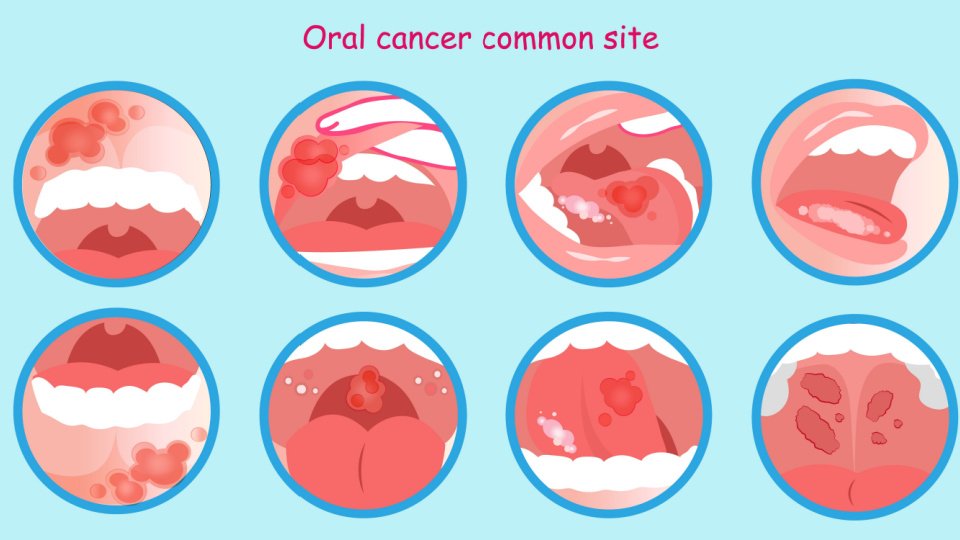Oral Cancer
Dental Treatments
Comprehensive Oral Cancer Diagnosis and Treatment
What is Oral Cancer?
Oral cancer is cancer that develops in any part of the mouth, including the lips, tongue, cheeks, floor of the mouth, hard and soft palate, sinuses and throat. Early detection is very important for effective treatment. Symptoms to watch for include persistent mouth sores, lumps, white or red patches, difficulty swallowing, and unexplained bleeding.
Diagnosis of Oral Cancer
Diagnosing oral cancer involves a comprehensive examination by a healthcare professional. If any suspicious areas are detected, a biopsy will be performed to collect tissue samples for further analysis in a lab. In this way, the cancerous cells can be detected.
Imaging Studies
Imaging studies like for example X-rays, CT scans, and MRI are other important diagnostics. With these methods, doctors can see the oral cavity and surrounding tissues. This is important for accurate staging of the cancer.
Blood Tests and HPV Testing
Blood tests can detect markers that indicate the presence of cancerous cells. Also, the testing for HPV is important, as HPV is a significant risk factor for developing oral cancer.
Treatment Options
After thorough examination and testing, the results help determine the most appropriate treatment options. Treatment plans are customized based on the cancer’s severity and stage. The treatment needs to be individualized for each patient, normally it there will be a surgery, radiation therapy, and chemotherapy.
Surgery
Surgical treatment involves removing the cancerous tissue and, in some cases, nearby lymph nodes. The extent of surgery depends on the tumor’s size and location. Sometimes, reconstructive surgery is needed to restore the appearance and function of the affected area.
Radiation Therapy
Radiation therapy uses high-energy beams to destroy cancer cells. It can be used alone or in combination with surgery. This treatment targets cancer cells while minimizing damage to surrounding healthy tissue.
Chemotherapy
Chemotherapy involves the use of drugs to kill cancer cells. It can be taken orally or administered intravenously and is often combined with other treatments. Chemotherapy is particularly effective for cancers that have spread beyond the initial site.
Conclusion
Early diagnosis and treatment are vital for improving outcomes and survival rates in oral cancer patients. Regular dental check-ups and awareness of symptoms can lead to early detection. If you notice any signs of oral cancer, consult a healthcare professional for a thorough examination and appropriate testing.
Good oral hygiene, avoiding tobacco and excessive alcohol use, and getting vaccinated against HPV are essential preventive measures. If you need more information or suspect you might have oral cancer, contact your healthcare provider for a comprehensive evaluation.
Understanding the diagnostic process and available treatments helps in making informed decisions about your health. Early intervention is key to managing oral cancer effectively and maintaining a high quality of life.
All you need to know about dental treatment, including price, aftercare and healing process, or contact us!

FAQ
How oral cancer is treated?
The treatment of oral cancer involves various approaches depending on factors such as the stage and location of the cancer, as well as the patient’s overall health. The primary treatment options include surgery, radiation therapy, chemotherapy, targeted therapy, and immunotherapy. Surgery involves removing the cancerous tumor and surrounding tissues, while radiation therapy uses high-energy radiation to kill cancer cells. Chemotherapy utilizes anti-cancer drugs to destroy cancer cells, and targeted therapy specifically targets cancer cells or molecular markers. Immunotherapy enhances the body’s immune system to recognize and eliminate cancer cells. The choice of treatment or combination of treatments is determined by a multidisciplinary team of healthcare professionals. Regular follow-up and supportive care are crucial for managing this cancer and minimizing treatment-related side effects.
How oral cancer starts?
Oral cancer typically originates in the cells that line the mouth and throat. The leading risk factors include tobacco use, excessive alcohol consumption, HPV infection, family history, poor oral hygiene, weakened immune system, and an unhealthy diet. Regular dental check-ups and screenings are crucial for early detection.
Why oral cancer occurs?
The exact cause of oral cancer is not always known, but there are several factors that can increase the risk of developing the disease. The primary risk factors include tobacco use (including smoking and smokeless tobacco), excessive alcohol consumption, certain strains of the human papillomavirus (HPV) infection, a weakened immune system, poor oral hygiene, a diet lacking in fruits and vegetables, and a family history of oral cancer. It’s important to note that having one or more of these risk factors does not necessarily mean that a person will develop oral cancer, but they can increase the likelihood. Regular dental check-ups and maintaining a healthy lifestyle are important for reducing the risk of oral cancer.
Contact us now in case you have any questions!
Types of Treatments
Find the best Treatments and most Popular Dentists & Clinics
Request Form
Get your free consultation
- Need guidance and reassurance?
- Talk to a real person from MedClinics!
- Let's find the perfect doctor together.
